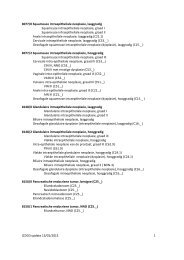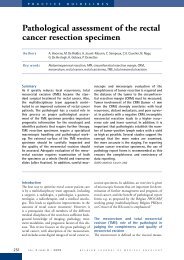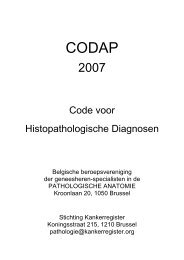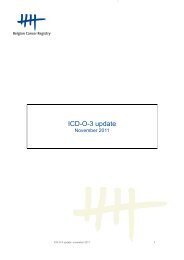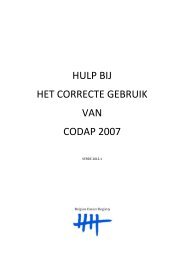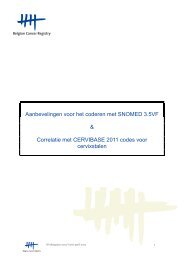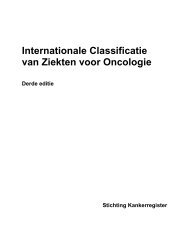Assurance de qualité pour le cancer rectal – phase 2 ...
Assurance de qualité pour le cancer rectal – phase 2 ...
Assurance de qualité pour le cancer rectal – phase 2 ...
Create successful ePaper yourself
Turn your PDF publications into a flip-book with our unique Google optimized e-Paper software.
4 PROCARE <strong>–</strong> <strong>phase</strong> 2 KCE reports 811 INTRODUCTIONIn 2004, the Belgian Section for Colo<strong>rectal</strong> Surgery, a section of the Royal BelgianSociety for Surgery, <strong>de</strong>ci<strong>de</strong>d to start PROCARE (PROject on CAncer of the REctum) asa multidisciplinary, profession-driven and <strong>de</strong>centralized project(www.belgian<strong>cancer</strong>registry.be). All medical specialties involved in the care of <strong>rectal</strong><strong>cancer</strong> established a multidisciplinary steering group in 2005. De<strong>le</strong>gates from therespective scientific societies as well as from the Belgian Professional Association wereinclu<strong>de</strong>d from the start, as it was evi<strong>de</strong>nt that the project should not only have ascientific backbone, but should be driven by the professionals. In a questionnaire morethan 80 % of the Belgian hospitals expressed their willingness to participate in theproject.The main objective of this multidisciplinary project is to reduce diagnostic andtherapeutic variability and to improve outcome in patients with <strong>rectal</strong> <strong>cancer</strong> by meansof:• standardization through gui<strong>de</strong>lines;• imp<strong>le</strong>mentation of these gui<strong>de</strong>lines (workshops, meetings, training forTME, pathology, radiotherapy and radiology);• quality assurance through registration and feedback.Multidisciplinary gui<strong>de</strong>lines on the management of <strong>rectal</strong> <strong>cancer</strong> were discussed and afirst draft was written in 2005. This first version of the PROCARE gui<strong>de</strong>lines was ma<strong>de</strong>availab<strong>le</strong> by the respective scientific societies. In the context of a study assigned by theKCE to PROCARE (summer 2006), the gui<strong>de</strong>lines were updated with recently publishe<strong>de</strong>vi<strong>de</strong>nce (part I of the study) [1].During the years 2005 <strong>–</strong> 2008, several workshops, postgraduate courses and seminarson <strong>rectal</strong> <strong>cancer</strong> were organised in the context of the PROCARE project. Specificdocuments (e.g. an atlas on Clinical Target Volume [CTV] during radiotherapy for <strong>rectal</strong><strong>cancer</strong>, a handbook on histopathologic examination of a TME specimen) werecomposed and discussed during discipline-specific workshops.Central registration of credib<strong>le</strong> and high-quality data is a key issue in a national projectlike this. Fortunately, PROCARE found a partner at the Belgian Cancer Registry (BCR).In 2005, a multidisciplinary dataset was elaborated for registration in a <strong>rectal</strong> <strong>cancer</strong>specific database at the BCR. Registration started in October 2005.In 2007, the RIZIV/INAMI <strong>de</strong>ci<strong>de</strong>d to financially support the project for 5 years. Abouthalf of the budget is <strong>de</strong>dicated to registration with feedback, whi<strong>le</strong> the other half isreserved for (re)training in or<strong>de</strong>r to foster imp<strong>le</strong>mentation of the gui<strong>de</strong>lines. The latterwill be done by means of peer-review of radiological pre-treatment staging results,planned CTV and TME specimens, and by ‘TME training’ by peers or candidate TMEtrainers who fulfil<strong>le</strong>d pre<strong>de</strong>fined criteria.In or<strong>de</strong>r to allow individual feedback and national/international benchmarking, it was<strong>de</strong>ci<strong>de</strong>d to set up a quality indicator (QI) system. For this cause, the conceptualflowchart provi<strong>de</strong>d in a previous KCE report on clinical QI [2] was consulted andadapted to the specific oncologic context. In general, some important steps need to betaken when <strong>de</strong>veloping and instauring a QI system in oncology (Figure 1). First, amultidisciplinary group should be composed, including all re<strong>le</strong>vant specialties involved inthe work-up of the tumour of interest. Specific to the Belgian situation, the Col<strong>le</strong>ge ofOncology(https://portal.health.fgov.be/portal/page?_pageid=56,512693&_dad=portal&_schema=PORTAL) <strong>–</strong> which is in charge of organizing the external evaluation in all domains ofoncology <strong>–</strong> should be represented. For the present study, all re<strong>le</strong>vant specialties arerepresented in the multidisciplinary working group and the PROCARE steering group.Above this, the Col<strong>le</strong>ge of Oncology is represented in the PROCARE steering group.Next, the multidisciplinary group should <strong>de</strong>ci<strong>de</strong> on the scope of the QI system (Figure1).



